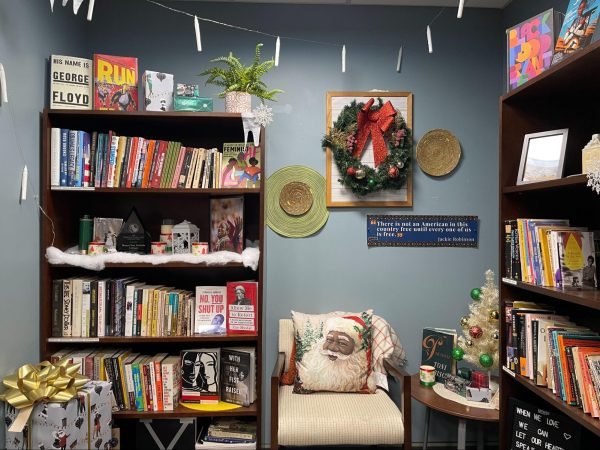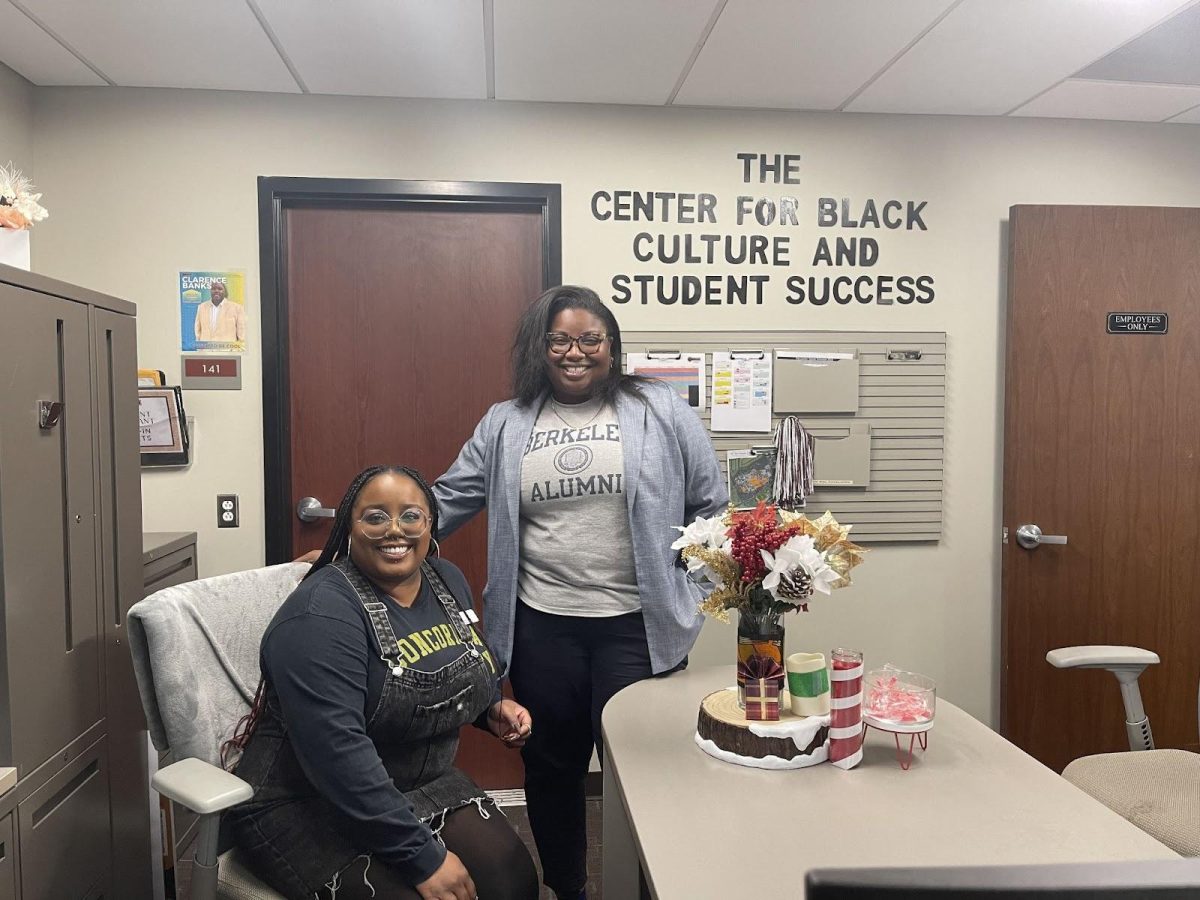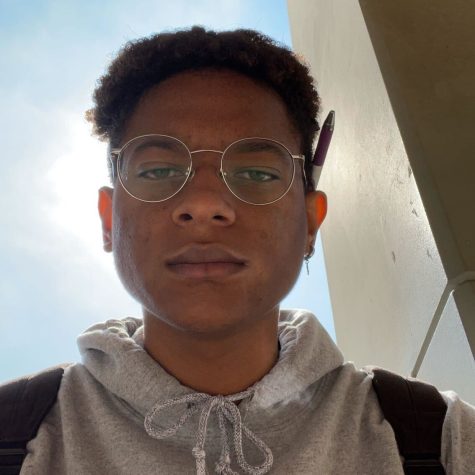Umoja— the Swahili word for “unity” and the first of the Seven Principles of Kwanzaa.
Four programs within the Equity Center all strive to provide services and support for different communities and ethnic backgrounds on campus: Arise, Dream, First Peoples Native Center and Reach/Guardian Scholars.
A keen eye that looked through their website of student-focused resources or walked into the center on campus may notice one program listed does not reside in building 16E.
The Center for Black Culture and Student Success, whose mission is to culturally and academically support the development of all members of the Black/African diaspora, is separately located on the first floor of the library in building 6-140.
The academic component of the CBCSS, UMOJA Aspire, is a dynamic program that provides more than educational support to its demographic of students.
Within Mt. SAC’s student body, only 3.94% of its population is reportedly made up of African-American and Black students. This fact sits adjacent to the lowering percentage of national enrollment for Blacks at public two-year community colleges. Enrollment has been consistently dropping at an increasingly sharper rate with each passing year.
To offset this lowering statistic and improve student retention rates, faculty and staff of UMOJA Aspire provide a space for monthly workshops, academic or emotional counseling and provide distinct learning opportunities for members.
The center’s academic counselor, Meklit Molla, is available for enrolled CBCSS students to schedule appointments with. Having an academic counselor in the same space where students hang out brings any student a step closer to reaching out for educational or emotional support and possibly exploring the many available resources on campus.
Mt. SAC alumni Erin Preston is the UMOJA Aspire program specialist whose job title covers a range of responsibilities, depending on the day. This could include organizing events, scheduling student meetings with Molla, and fostering a safe and close-knit community.
Every inch of the CBCSS are plastered with posters, autobiographies and texts from influential and historical figures within the African-American and Black diaspora.

Walking down the entrance hall to the left, there is a lounge for enrolled members to hang out, do homework, enjoy snacks and play games.
Walking down the entrance hall to the right, there is a computer lab filled with laptops, scantrons, blue books, pens and miscellaneous school supplies that students can use. These services, once enrolled, are free of charge.
Just recently on Nov. 28, CBCSS and UMOJA Aspire hosted its transfer application submission jam in their computer lab from 12 p.m. to 5 p.m. to help students complete last-minute transfer applications, personal statements and cover letters, confirming applicable transfer credits and informing listeners on how to petition for graduation.
CBCSS is also in partnership with the Student Health Center’s mental health expert Tim Leslie to host weekly roundtable discussions for students.
The discussion is called Vibe Check, hosted every Tuesday from 11:30 a.m. to 12:30 p.m. and is open for those willing to speak about their concerns or any daily thoughts in a completely confidential space.
“We are very big on co-programming and partnering with other resources on campus,” Preston said. “Making sure that we have contacts everywhere for our students to be sent to or for them to come to us. Very big on networking.”
Despite the CBCSS being tucked away on the first floor of the library, Preston values having a dedicated space for Black culture. She hopes for increased student engagement and attention toward the CBCSS and other equity center programs, envisioning individual spaces for each program to celebrate diverse cultural backgrounds and foster a sense of visibility and unity.
“It is a double-edged sword,” Preston said. “I think it’s very important that our students be separated from other programs because I think all students in those demographics also deserve to have their own space. Unfortunately, [The CBCSS center’s location] is in the cut but we have tried our best to make ourselves known.”
Jarred Robinson, 22, a student-worker for CBCSS majoring in behavioral science, left his hometown in Indiana with three choices on where to attend college: New York, Texas or California. Robinson touched down in Southern California and went straight from the airport to Citrus College for a campus visit. The next morning, Mt. SAC was next.
Selecting both his state and school marked just the start for Robinson. Seeking a new community beyond his hometown, friends and family, he stumbled upon the center in April 2019 and has remained an integral part of the CBCSS ever since.
“I met Clarence, our head of the program and he just took me in, right under his wing,” Robinson said. “I didn’t know him. He met my mom for about 40 or so minutes and ever since then it was just all friendly.”
Clarence Banks, director of CBCSS, had sent CBCSS members on a field trip with limited availability. Robinson was a first-year member and was excited about the opportunity. Banks then put Robinson’s name on the list, a trip which Robinson said boosted him a lot. “It changed me, in a lot of ways.”
Trinity Phillips, a 19-year-old psychology major, is one of the active student members of the CBCSS.
“Last year was the first time we did something as a center and we all went to go see Black Panther,” Phillips said. “We all dressed up in all black, we were on these charter buses, it was real fun.”
If Phillips is not at the center drawing and interacting with her friends, she is either at a dance studio or perfecting and enjoying her love for art at home.
Jason Ntagahoraho, 22, an agriculture business major, grew up and learned education in Burundi and Rwanda, two East African countries. For Ntagahoraho, he wouldn’t know where he would be without the support of the CBCSS and he is all the more appreciative of creating lasting moments with others.
Any African-American Mt. SAC student can join CBCSS or any of the other Equity Center programs to speak with a diverse cast of counselors, meet other college mates, develop a sense of community, get connected or just hang around.
“We accept all students and we do encourage other students because that creates allyship and creates a positive interaction everyone can experience,” Preston said. “A lot of our students just feel like, you know, they need to play with the cards they were dealt but we are here to hand them a new deck.”
The faculty and students who choose to spend parts of their day in building 6-140 share the sentiment that the CBCSS and UMOJA Aspire has impacted all of their lives tremendously. Whether that be culturally, academically, spiritually or all of the above.



